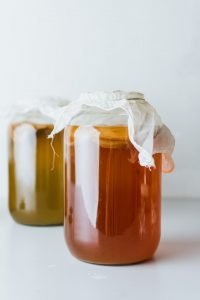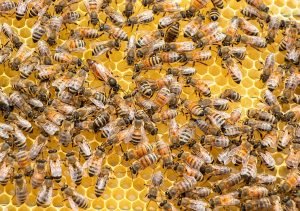
Raw honey is a thick, sweet-tasting liquid that is made by bees using rose nectar. It is extracted from the honey of a hive and is eaten after being filtered from any types of impurities. It is generally known by the term honey. Its color and clarity vary, and the taste depends on the type of rose whose nectar was used.
What distinguishes raw honey is the high levels of fructose, glucose, and monosaccharides. In addition to being free of fat and cholesterol, it contains 70-80% of sugar, which is responsible for its sweet taste.
Because of this, doctors consider honey a necessary food for our body, since it is a very good source of carbohydrates. Plus, one tablespoon of honey provides us with approximately 64 calories.
After we have stated some important characteristics of honey, let’s now talk about its main components which are:

Bee honey has many properties. It is anti-bacterial and antiseptic. Besides, it contains nutrients that are important for human health.
In the table below, we have stated the most important nutrients of bee honey and their nutritional values.
According to the US Department of Agriculture, 100 grams of honey contains the following nutrients:
| Nutrients | Values |
| Calories | 167 calories |
| Fat | 6.67 g |
| Carbs | 26.67 g |
| Sugars | 20 g |
| Dietary fiber | 3.3 grams |
| Sodium | 833 mg |
The benefits of honey are numerous and known by most people of the world. People everywhere have been using honey in multiple ways, as food for the body and as ointments to treat infections and other diseases. Since ancient times, individuals have been using honey as part of alternative medicine to treat and disinfect wounds and burns.
Listed below are most of its health benefits:
Bee honey contains many health properties that benefit the human body. The most important of these benefits are:

Honey is a high-value food substance that people use as food for children and adults. It is the only local substance that is not man-made and consumed as food that does not need refining. We can preserve honey for a long time if we store it properly.
Honey replaces the sugars that the body consumes during the physical or mental efforts a person makes. Also, lots of people may use it in the treatment of cases of weight loss and thinness.
Natural honey is an antioxidant because it contains lots of chemical compounds such as flavonoids, phytochemicals, and ascorbic acid. It is similar to antibiotics in that it has the ability to kill many microbes, viruses, and fungi. It also interacts with cells in the body to secrete antiseptic substances that reduce infections and poisoning.
As an alternative to refined and processed sweeteners, honey contributes to the prevention of many problems such as obesity, heart disease, and arteriosclerosis. It contributes to reducing cholesterol and fats in the blood.
Unlike refined sugars such as sucrose, honey does not ferment in the stomach. It does not stay long to be digested. Thus, it does not pose any risk of bacterial invasion. It passes directly from the small intestine into the bloodstream without causing any irritation in our digestive system as sucrose does.
One clinical trial also found that honey helps treat:
Honey plays a key role in protecting the teeth from decay and maintaining their proper growth. It also plays a role in strengthening and protecting the gums.

Honey contains vitamins and antioxidants. Pinocembrin, for example, is one of the unique antioxidants which we can find only in honey. Antioxidants have a significant role in preventing cancer and the proliferation of cancer cells, especially in cases of esophageal, mouth, intestinal, and stomach cancers.
Many researchers have found that honey is an effective and safe remedy for children’s cough. It is one of the best over-the-counter medicines ever known. It helps remove phlegm, throat infections, and cough. Because of this, researchers have included it in the manufacture of many cough medicines.
Several studies have found that honey has an effective role in regulating blood pressure and increasing hemoglobin.
Honey is a source of energy supply to the body. It raises the level of blood sugar (glucose) in a short period. Thus, it is the ideal choice for providing athletes with energy and helping them to exercise and perform physical activities.

Its use as a source of carbohydrates during exercise helps to significantly improve performance, especially during endurance races and cycling.
Honey contains the enzyme responsible for the production of hydrogen peroxide. This makes it effective in treating and disinfecting wounds and relieving pain. In addition, it prevents germs and bacteria from growing by creating an acidic environment and, thus, preventing their infection.
Several studies have proven that the use of honey locally on superficial burns helps to heal them faster and effectively.
Health professionals have found that honey benefits the skin a lot. It helps with:
For this reason, laboratories use raw honey to manufacture many cosmetics and soaps that help to rejuvenate the skin. Besides, they use it to prepare eye treatment ointments, since it heals eyelids and corneal infections in addition to ulcers effectively.
Honey is an analgesic for the body. So eating honey before bed helps calm the nervous system and overcome some sleep disorders such as insomnia.
Bee honey can help relieve diarrhea and reduce the duration of the infection as well.
In addition to this, it increases the amount of water and potassium intake, which are important for the patient’s body. As a result, it reduces the period of diarrhea.

One of the most important benefits of bee honey is that it effectively helps reduce the problem of GERD. It controls the reduction of the leakage of digestive juices from the stomach into the esophagus.
This means that it protects you from developing GERD and the unpleasant symptoms that come with it.
The World Health Organization (WHO) recommends using honey as a home remedy to treat coughs and colds.
The WHO has also found that honey has an effective role in treating nocturnal cough, thus improving sleep quality during the period of infection.
Bee honey is a safe food for most people. Still, there are some potential risks that one has to take into account when eating it. These risks are:
It is necessary not to give honey to children under one year of age, as it may pose a threat to their health.
Raw honey may contain dust particles that may carry germs of bacteria that cause food poisoning for children who, very often, lack strong immunity to defend the body.
People who are prone to allergies should beware of eating honey, as honey allergies though they are rare, they can occur.
This may be due to the presence of bee pollen in honey, as bee pollen is a mixture of pollen and digestive enzymes from bees, which can lead to a serious allergic reaction.
Leave a comment